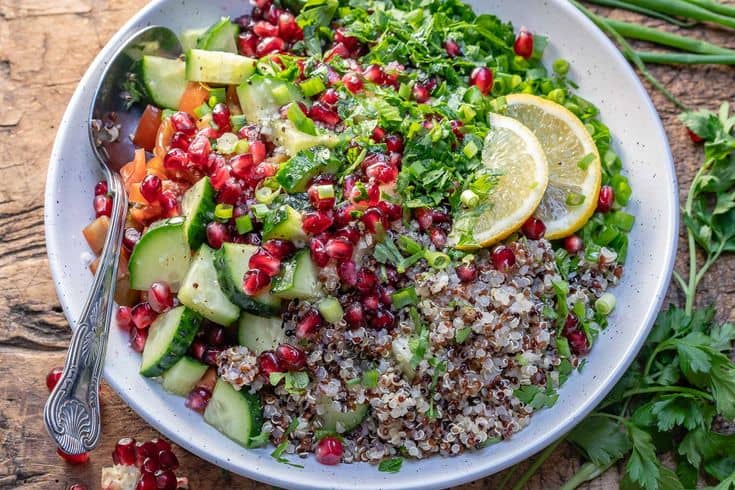Here’s a classic tabbouleh recipe:
Ingredients:
- 1 cup bulgur wheat
- 2 cups water
- 1 large bunch fresh parsley, finely chopped
- 1/2 cup fresh mint leaves, finely chopped
- 4-5 ripe tomatoes, diced
- 1 small red onion, finely chopped
- 1/4 cup lemon juice
- 1/4 cup extra virgin olive oil
- Salt and pepper to taste
Instructions:
- Rinse the bulgur wheat under cold water and drain well.
- In a saucepan, bring 2 cups of water to a boil. Add the rinsed bulgur wheat and reduce heat to low. Simmer for about 10-12 minutes or until the bulgur is tender and the water is absorbed. Remove from heat and let it cool.
- In a large mixing bowl, combine the chopped parsley, mint, diced tomatoes, and chopped red onion.
- Once the bulgur is cooled, add it to the bowl with the vegetables.
- In a small bowl, whisk together the lemon juice, olive oil, salt, and pepper.
- Pour the dressing over the tabbouleh salad and toss well to combine.
- Taste and adjust seasoning if needed.
- Cover the tabbouleh and refrigerate for at least 30 minutes before serving to allow the flavors to meld together.
- Serve chilled or at room temperature as a side dish or as a light meal.
Enjoy your homemade tabbouleh!
FAQs
What is Middle Eastern tabbouleh made from?
- Middle Eastern tabbouleh is typically made from a base of finely chopped parsley and mint, mixed with bulgur wheat, diced tomatoes, chopped onions, and seasoned with lemon juice and olive oil.
How long does tabouli last in the fridge?
- When stored properly in an airtight container in the refrigerator, tabbouleh can last for about 3 to 4 days. However, it’s best enjoyed within the first couple of days for optimal freshness and flavor.
Is tabouli healthy to eat everyday?
- Tabbouleh can be a healthy addition to your daily diet when consumed in moderation. It’s packed with nutritious ingredients like fresh herbs, vegetables, and whole grains. However, like any dish, it’s important to balance it with other foods to ensure a well-rounded diet.
What is a substitute for tabbouleh?
- If you’re looking for a substitute for tabbouleh, you might consider making a similar salad using quinoa instead of bulgur wheat. Quinoa provides a similar texture and is gluten-free, making it suitable for those with gluten sensitivities. You can also experiment with different combinations of fresh herbs and vegetables to create a salad with a similar flavor profile. Additionally, you could try other Middle Eastern salads such as fattoush or cucumber-tomato salad as alternatives.

Pages: 1 2
